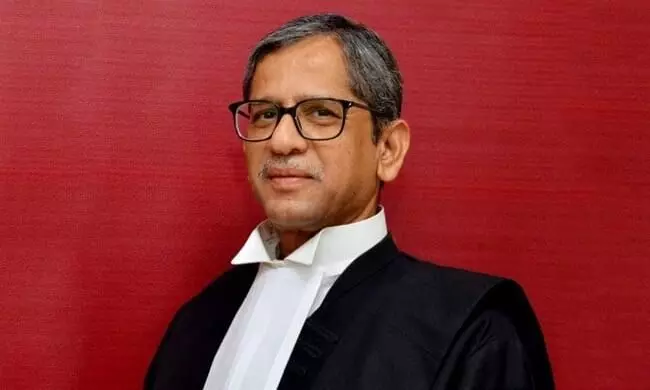
No justice invites anarchy; rights and dignity must be protected: CJI
text_fieldsChief Justice of India NV Ramana
New Delhi: Denial of justice would lead to anarchy while peace shall only prevail when people's rights and dignity are recognised and protected, Chief Justice of India (CJI) NV Ramana said, reports IANS.
Addressing an audience after laying the foundation stone for a new building for the high court complex in Srinagar on Saturday, Ramana said mere laws were not enough to build tradition but men of high ideals to infuse life in the skeleton of law.
"Denial of justice would ultimately lead to anarchy. Soon the institution of the judiciary would be destabilized as people will look for extrajudicial mechanisms," CJI said.
"As poet Raja Basu, an admirer of Kashmir, observed, Jammu and Kashmir is the confluence of three great religions -- Hinduism, Buddhism and Islam. It is this confluence which is at the heart of our plurality which needs to be sustained and cherished," he said
Further, the CJI said that it is imperative for a healthy democracy, people must feel that their rights and dignity are protected and recognised while disputes are adjudicated expeditiously.
"Dear Judges and judicial officers, you play a very significant role in our constitutional scheme. The commoner always considered the judiciary as the ultimate guardian of rights and liberties," he said. CJI reminded his audience that litigants could be under psychological stress, illiterate, unaware of the law or in various financial issues. Therefore, the judges should try and make them feel at ease.
He said often, litigants are under a lot of psychological stress, and they may be illiterate, unaware of the law and have various financial issues, and the judges should try to make them feel at ease.
Later he lamented that judicial infrastructure had not been subjected to a revamp after the independence in order to meet the growing demands of modern India. "We are far behind in making our courts inclusive and accessible. If we don't attend to this urgently, the constitutional ideal of access to justice will stand defeated... The condition of judicial infrastructure across the country is far from satisfactory. Courts are operating from rented accommodations and under deplorable conditions," he said.
Also, he said that the inability of the formal justice system to deliver fast and affordable justice to all had been a major challenge to the protection of the rule of law as well as human rights. "The justice delivery mechanism in India is very complex and expensive. The judiciary must be at its innovative best to ensure that the challenges to its working are met with just and constitutional measures", he said.
He said that in India, there is a large digital divide exists, and there is a lot to be done to harness the full potential of technological innovations.
He quoted Winston Churchill and said, "We shape our buildings; thereafter they shape us... Although the persons who will occupy this building would be the members of the Bar, the Bench and their support staff, we must not forget that the focal point of any justice delivery system is the litigant, who is the justice seeker."






















